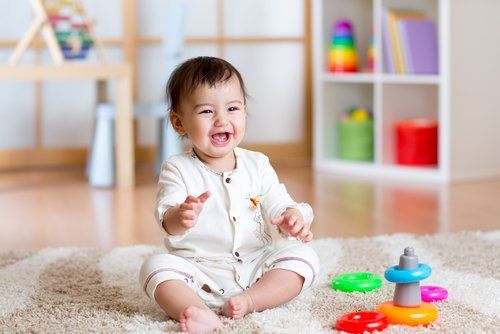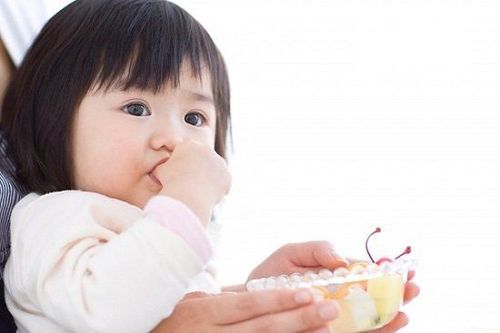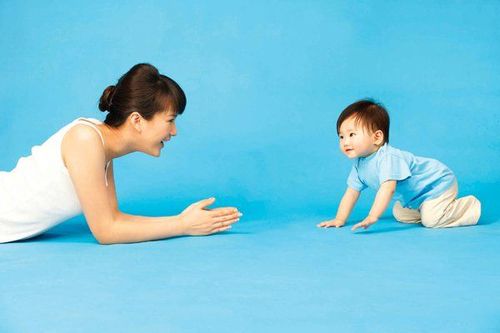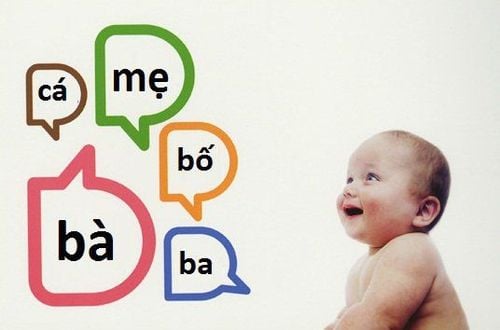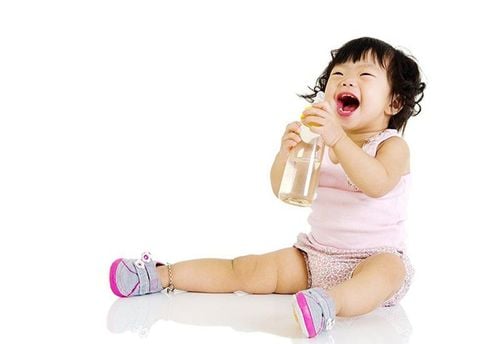This is an automatically translated article.
By the time your baby is 23 months old, your baby will start to be more interested in playing with other children. Children can imitate the way older children play or toddle along after they play catch. Your child will also try to get you involved in whatever game he or she is playing. During this time, children ask a lot of “why” questions. "Why is it milky white?" "Why did the sun disappear?" "Why is it dirty?" "Why shower?" Much of it is the 23-month-old's curiosity about the wide world. More importantly, this is actually how your toddler talks to you, using his limited communication skills and vocabulary. In this article, we will provide useful information for parents to understand the language development and cognitive development of their 23-month-old baby.1. Language development milestones of 23-month-old babies
Your 23-month-old's language development may follow a simple two-step command, such as "Come over and sit down so I can tie your shoelaces." A child's vocabulary probably includes at least 20 words that he can say clearly (and many more that are more difficult to understand), and he'll soon be adding words so quickly you won't be able to keep track. Your toddler may utter short sentences, like "The milk is out" or "The dog is out of milk". And she can answer simple questions like "What's your name?" and "What did the cat say?" Your baby will verbally tell you when she's hungry and thirsty, so you no longer have to guess if that's why she's a little cranky...at least for a while. Children can also understand opposites. If you look at a book with pictures, such as a big dog and a small dog, or a big car and a small car, and ask her which one, she'll know.So what can parents do to develop language and literacy skills for their 23-month-old baby?
You already know that reading to your child is one of the best ways to boost your child's language abilities. But for now, you've probably only focused on familiar stories you've probably read together since birth. Now is the time to start expanding your book selection. Find stories with many objects in them that are both familiar to your child and not so well known. As you read, stop from time to time and ask your child questions about the book ("What is the kitten doing? Where is the boy?) Point to objects and give them the opportunity to say aloud the names of things they know.
.
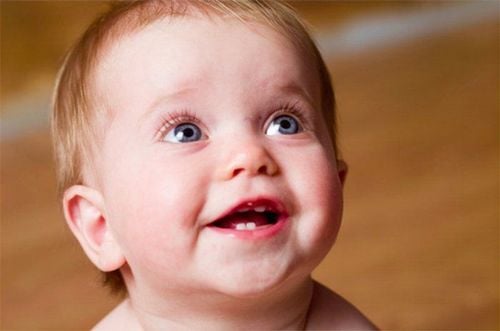
Đọc sách cho con mình là một trong những cách tốt nhất để tăng cường khả năng ngôn ngữ của trẻ.
2. Milestones of cognitive and memory development
When babies are 23 months old, they have the cognitive skills to remember that they left their doll in the car, even after a few hours have passed. The child can also associate objects she sees in reality with things she sees in books. If you have a shape classifier, you'll probably notice that kids can now put some arrays in their proper places. Many toddlers are also trying their hand at plays, such as pretending to eat a plastic banana and telling you how delicious it is.Give your child plenty of opportunities to engage in "unstructured" play. For example, give her a set of blocks and let her build a tower or train, or give her a puzzle with just a few pieces so she can have the satisfaction of completing it on her own. Props like toy phones, grocery carts, toolboxes, and tea sets give your baby the chance to imitate the adult activities she sees around her.
In addition, at this stage the cognitive development of the child has improved markedly:
Many mothers are restless and estimate how long their child needs to go to the bathroom to avoid soiling their clothes. However, your baby can already recognize a dirty diaper or can notify you when he wants to go to the bathroom. This is also an ideal time for your child to practice potty training. Children have different tastes and preferences for different foods. Children can understand and remember about 50-100 simple words. Children can say polite words when taught by their parents such as: Thank you, please, yes, yes.... Parents should also encourage them. Encourage your child to say hello, talk more by being an example for children to learn, many times will create a good habit for children later. When you ask your child to do something for you, say thank you, the child will be very interested and will also learn a lot from it. Children love rhymes or children's songs that have fun, easy-to-remember tunes, you'll be surprised if at some point you turn on a song and your child can sing along correctly. At this stage, a child's memory thrives beyond the budding vocabulary. The child is showing signs of understanding the concepts of objects. Children can also grasp the concept of time, solve simple problems, visualize objects in their mind. Children love to draw and doodle and can even draw lines and circles. Children can remember names of people close to them, imitate your tone of voice, and repeat new words or phrases they hear over and over. At this point, you can guide your child in some simple things such as finding his own toys, sitting on the potty when he wants to go to the toilet, etc.
3. Social and emotional development milestones
23-month-old babies often have unstable emotions, they may appear uncomfortable and miserable, but they can immediately return to normal. They also have a hard time controlling their anger, so they can sometimes show a little resistance, as if to test their parents' patience. Do not be too angry with your child when you speak but they do not listen, the more angry you are, the more persistent the child's "bullying" will be, instead, sit quietly and listen to the child, when he or she does not see it. If anyone pays attention to their tantrums, the anger will pass and a few times they will understand the problem is that even if they do, the child will not meet any of the requirements.Children enjoy and want to play with other friends, children can also imitate the actions of these friends. Your baby also knows how to win affection and is therefore able to give toys or treats they like to those they hold dear. 23-month-olds love to imitate and can amuse others by making funny faces or acting funny. This is also a time of separation crisis, children often want to attract the attention and concern of loved ones by demanding more holding or tugging on your hand when they want something.

Trẻ 23 tháng tuổi thường có cảm xúc không ổn định
4. Nutrition for 23-month-old children
Maintain good nutrition for your baby like last month, but also need to add some groups of substances because your baby is in growth momentum. Besides 3 main meals, 1-2 snacks, children need to be supplemented with 500ml of milk per day to supplement calcium and other nutrient groups that are not found in many foods.Sugar and flour still make up a large proportion of the diet. You need to balance the ratio of protein, animal protein should be more than vegetable protein to ensure enough energy for children's activities.
In order to help children digest better, mothers still need to regularly add fresh fruits and vegetables. Children 23 months old also need to be supplemented with fruit juice, yogurt, fresh milk or biscuits with enough nutrients for this age.
In addition, you should learn a variety of new foods to stimulate your child's taste buds, helping them eat more deliciously.
5. Play and Activity
This is a good time to involve your child in a variety of indoor and outdoor activities. Some suggestions are as follows:Playing with sand: This activity not only helps your baby develop better motor skills but it also helps him develop a better immune system. Bubble game: You can get soapy water and blow bubbles with your child. Ask your child to chase the bubbles and burst them. This is a fun water activity that can help kids get their feet active. Draw pictures with fruits and vegetables: Give your child toys that simulate fruits or animals, play cooking games, or help them draw different patterns and shapes on paper. Toddlers love to play with colors and anything vibrant that captures their attention. This activity can keep your baby busy for a long time. Crawling activity: You can create various obstacles on the floor and ask your baby to overcome them. Your baby is now big and crawling puts pressure on his arm and leg muscles, which helps him build stronger arm and leg muscles. Kneading: Give your child some colorful clay and create fun toys or animals with them. Pull toys: Your child has a softer walk than in previous months and may be ready to pull a wagon or a wheeled toy with a handle. Tricycle or balance bike: Look for a tricycle or bike for 2-year-olds so your child can learn to balance.

Duy trì dinh dưỡng tốt cho trẻ vì em bé của bạn đang trong đà tăng trưởng
6. Tips to improve the development of your 23-month-old baby
Engage children in activities that require grouping, zoning, or combining objects. Read and sing to your baby, he is learning to speak and understand. This will help your child have an enhanced vocabulary. Pay proper attention to your baby's diet and nutrition. Babies love to explore things and are constantly on the move. The advice for you is that you should equip child prevention in the house. Schedule your child's sleep and stick to it. Don't indulge your baby's every request and say NO from time to time. Appreciate your baby whenever the need arises. Talk and teach your baby to stay close to you whenever you step out of the house. Even though he may not agree with what you say, you should keep telling him, until he really understands it. Your child may say or act funny at different times; It is a good idea to keep a diary of all such activities by your child. Children are often interested in whether you are happy and excited when they are around, not whether the house is neat and clean. So always spend a lot of time talking, singing and laughing with your baby. such as preparing clothes for the baby the night before, buying a slow cooker or convenient equipment and tools for the baby's needs. In addition, 23-month-old children need 5mg of elemental zinc/day to eat well, reach the correct height and weight and exceed the standard. Zinc plays a role in affecting most biological processes taking place in the body, especially the breakdown of nucleic acids, proteins... Organs in the body when zinc deficiency can lead to a There are a number of diseases such as neurological disorders, irritability, etc. Therefore, parents need to learn about the role of zinc and guide them to appropriate zinc supplements for their children.In addition to zinc, parents also need to supplement their children with other important vitamins and minerals such as lysine, chromium, B vitamins,... errands.
Please regularly visit Vinmec.com website and update useful information to take care of your baby and family.
Reference sources: babycenter.com, parenting.firstcry.com, thebump.com




